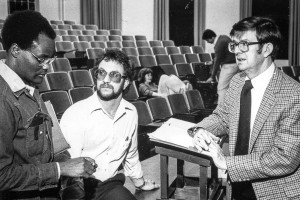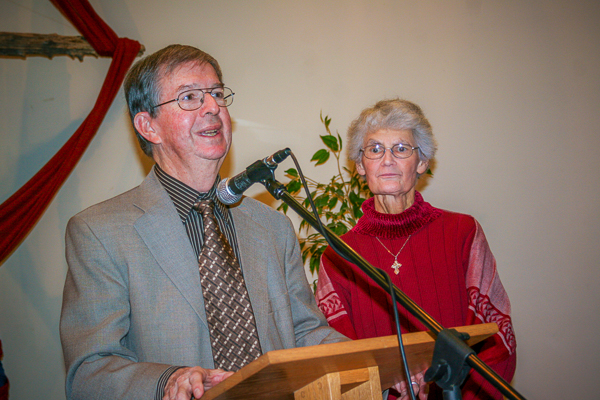Calvin E. Shenk, professor emeritus of religion who taught at Eastern Mennonite University from 1976-2001, has died. He resided in Harrisonburg, Virginia. His wife Marie passed away in 2010.
The couple, both 1959 graduates of Eastern Mennonite College, returned after 14 years of missionary work in Africa to make an indelible mark on the vision and goals of the institution.
Shaping the cross-cultural curriculum
Before coming to EMU, Shenk taught theology courses at Meserete Kristos College in Ethiopia for 14 years. The couple served with Eastern Mennonite Missions in Ethiopia from 1961 to 1971.
Shenk earned a PhD in religious education from New York University in 1972 and then joined the Bible and religion faculty of EMU four years later.
Both he and his wife were avid scholars. Marie, who earned a master’s of religion from Eastern Mennonite Seminary in 1998, was an administrative assistant to the academic dean from 1976 to 1990.

The Shenks led their first of four EMU trips in the fall of 1978, taking students to the Middle East. He was among those proponents for making the cross-cultural program integral to EMU’s required curriculum. As a member of EMU’s cross-cultural task force in 1981, Shenk brought a passion for the transformative possibilities of immersion in another culture.
In September 1983, Shenk penned an essay justifying the cross-cultural requirement for every EMU undergraduate. “This kind of education will be both painful and enjoyable,” he wrote. “The results will not always be predictable. We will experience anger and exhilaration, depression and vision. But growth will occur, and that is what college is for. Such education will make us better citizens of the global village and better members of God’s international kingdom, the church.”
Led by his faith, enthusiasm and curiosity
Shenk was named Teacher of the Year in 1982, earning praise for helping change the lives of his students.
Provost Fred Kniss, who benefited from Shenk’s mentorship during his junior year spent on independent study in India (before the cross-cultural program was formalized), says Shenk had “remarkable qualities,” including a “generous soul.”
“He was enthusiastically curious about the world around him — especially about the religious lives and practices of people around the world,” said Kniss. “He was a committed Christian who loved engaging with people from other traditions. And he was an effective teacher because he knew how to communicate his enthusiasm and curiosity in ways that were contagious.”
Another on campus who shares these sentiments is Bible and religion professor Linford Stutzman. He was a student of Shenk’s in the early 80s, and since then has led many cross-cultural trips to the Middle East with his wife Janet — much as the Shenks did together.
Stutzman writes: “It is impossible to list the unique lessons about strong faith and bold humility, courageous mission and cultural sensitivity, unwavering Anabaptist identity and respect for people of all religions, gentle flexibility and stubborn resistance to evil, that Calvin communicated to his students. Whether teaching in the classroom, leading students in the Middle East, speaking in congregations, or writing to people seeking to be faithful and relevant in their witness in the world, Calvin’s life and theology were the same everywhere. Calvin will be remembered with deep appreciation by his students. I will always be grateful for the privilege of being one of them.”
A life of service
Among other roles, Shenk was principal of Nazareth Bible Academy and chair of the Mennonite Board of Education in Ethiopia. He was a member of the overseas committee of the former Mennonite Board of Missions, 1977-1990.
An expert on Jewish-Christian relations, for eight years during his teaching career at EMU, he spent each spring semester in Jerusalem as a research scholar at Tantur Ecumenical Institute.
Shenk wrote several books, including Who Do You Say That I Am? Christians Encounter Other Religions (Herald Press, 1997), and dozens of articles.
In 1994 the Shenks began an assignment in Israel and Palestine under Mennonite Board of Missions (a precursor to Mennonite Mission Network), and Mennonite Central Committee. For the next seven years, until 2001, the couple lived six months of every year in Jerusalem, returning to Harrisonburg the remainder of the year where Shenk continued to teach at EMU. In 2002, Shenk retired from EMU. Marie died in 2010. The Shenks raised three children, all graduates of EMU: Doug ’86, Duane ’90 and Donna (Sensenig) ’91.
Visitations will be at 6-8 p.m. on Sunday, Sept. 20 and at 12-1 p.m. on Monday, Sept. 21 at Park View Mennonite Church. A memorial service will be held, also at the church, at 1 p.m. on Monday, following visitation.
Portions of this article are reprinted from a March 2, 2014 article about Calvin Shenk written by Rachael Keshishian & Bonnie Price Lofton.

He was my favorite professor at EMU. He helped me see missions in a new light and I am forever grateful. My love and prayers for his family and community.
We had an Easter Sunrise together in POKHARA.
Calvin Shenk was my older brother, I’ll miss him dearly, but I know he is now in Jesus’ arms.
I first met Calvin Shenk as a student at the Bible Academy in Ethiopia. It was many years after his tour as a teacher at the school. Then I worked with him several years on the board of MKC college. I thank God for people like Calvin and all the missionaries who came to Ethiopia to bring the good news to our land and our people. I am a living witness to the faithful service of these people. Those of us who have come to know the Lord through the ministry of Meserete Kristos Church will not forget these missionaries.
I first met Calvin while the church was forced to go underground. Although his influence in the lives of my colleagues began way before I met him. When we met each other, he saw the potential for me to be educator. He coached me and walked with me in my graduate study. Calvin loved to invest in me. He was instrumental in bringing me to EMS. He was a long time friend of MK College. We worked together while I was dean. He was my mentor, colleague and fellow pilgrim. His soft communications and wise counsel were unique. His tears spoke volumes. He ministered Christ’s love to me and leaders of MKC in several circumstances. He is one of those leaders whom I take to be a leader by example. Thank you for the life well lived.
Hailu Cherenet